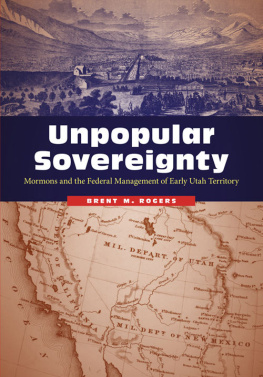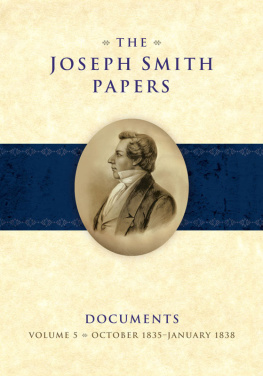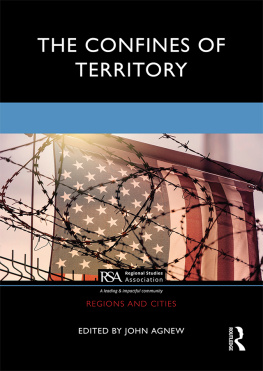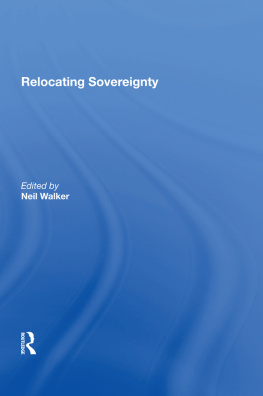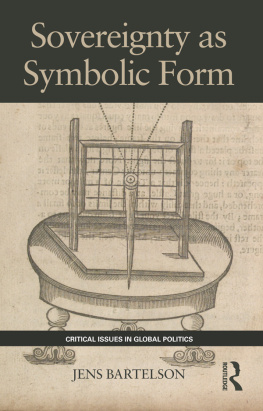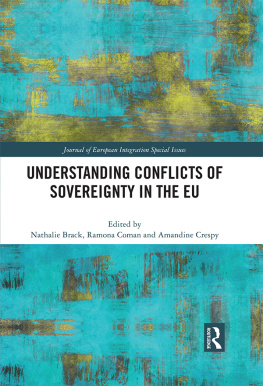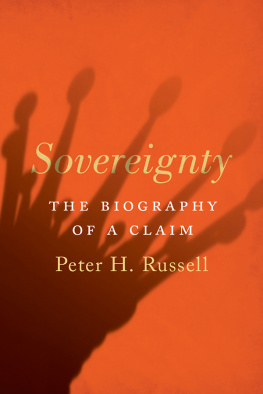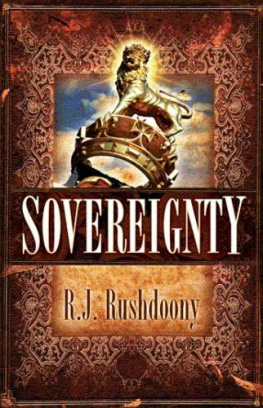Brent Rogers skillfully places the Utah experience at the fulcrum of Americas growing sectional divide in the 1850s and offers important new insights into the deterioration of the Union. This book will force historians of the West to consider Utah Territory alongside Kansas Territory as a hotbed of national debate over popular sovereignty. Beyond that, it should prompt a recalibration of the national narrative to reflect the ways in which religion helped to define what it meant to be an American in the decade leading into the Civil War, sometimes just as much as race.
W. PAUL REEVE, author of Religion of a Different Color: Race and the Mormon Struggle for Whiteness
Balanced and extensively researched.
NICOLE ETCHESON, author of A Generation at War: The Civil War Era in a Northern Community
UNPOPULAR SOVEREIGNTY
Unpopular Sovereignty
Mormons and the Federal Management of Early Utah Territory
BRENT M. ROGERS
UNIVERSITY OF NEBRASKA PRESS Lincoln and London
2017 by the Board of Regents of the University of Nebraska
Portions of originally appeared as Armed men are coming from the state of Missouri: Federalism, Interstate Affairs, and Joseph Smiths Final Attempt to Secure Federal Intervention in Nauvoo, in Journal of the Illinois State Historical Society 109, no. 2 (Summer 2016): 14879.
Portions of originally appeared as A distinction between Mormons and Americans: Mormon Indian Missionaries, Federal Indian Policy, and the Utah War, in Utah Historical Quarterly 82, no. 4 (Fall 2014): 25071. This article won the 2015 Arrington-Prucha Prize from the Western History Association.
Cover designed by the University of Nebraska Press; cover images are from the interior.
All rights reserved
Library of Congress Cataloging-in-Publication Data
Names: Rogers, Brent M., author.
Title: Unpopular sovereignty: Mormons and the federal management of early Utah Territory / Brent M. Rogers.
Description: Lincoln; London: University of Nebraska Press, [2017] | Includes bibliographical references and index.
Identifiers: LCCN 2016012916 (print) | LCCN 2016013989 (ebook) | ISBN 9780803276772 (cloth: alk. paper) | ISBN 9780803295858 (pbk.: alk. paper) | ISBN 9780803296442 (epub) | ISBN 9780803296459 (mobi) | ISBN 9780803296466 (pdf)
Subjects: LCSH : Representative government and representationUtahHistory19th century. | UtahHistory19th century. | United StatesTerritories and possessionsPolitics and government. | Religion and politicsUtahHistory19th century. | Mormon ChurchHistory19th century. | Church of Jesus Christ of Latter-day SaintsHistory19th century.
Classification: LCC JK 8490. R 64 2017 (print) | LCC JK 8490 (ebook) | DDC 979.2/02dc23
LC record available at http://lccn.loc.gov/2016012916
The publisher does not have any control over and does not assume any responsibility for author or third-party websites or their content.
For Ashley, Keagan, Makinsey, and Braxton
and
In loving memory of Eugene Ahlstrom and
Elmerae Rogers, my grandfathers
CONTENTS
Map
Figures
I have long been fascinated by reading the Acknowledgments section of historical monographs. I am always amazed at the number of people that help shape an individual scholars thinking in bringing a book to fruition. Now having gone through the process of researching, writing, and editing a historical monograph, I see just how many people truly shaped the course of this book. Though my name graces the cover and any success or pitfalls of the work ultimately fall to me, I wish to express my gratitude to those individuals and institutions that supported and influenced me in the process.
This book was once a dissertation, but before I could reach that stage I received some great advice in my pursuit of knowledge. While working on a Masters degree in public history, Lee M. A. Simpson and Joseph Pitti at California State University, Sacramento, strongly encouraged me to pursue a PhD. For their instruction and push to continue my education, I will always be grateful. The faculty in the Department of History at the University of NebraskaLincoln provided me numerous opportunities to engage in the work and practice of history while I pursued a doctoral degree. Many thanks go to the committee who steered me through the dissertation process. William G. Thomas, Jeannette E. Jones, Timothy R. Mahoney, and Kenneth Price were all incredibly generous with their insights, incisive comments, and careful readings of my work. Douglas Seefeldt guided my doctoral education before he moved on to Ball State University and continues to be my advocate. It is always enjoyable and enlightening to talk with Doug, but especially fun to discuss the latest Buffalo Bill work. Thanks, Doug, for everything! Though not on my dissertation committee, Peter Maslowski, James Le Sueur, Andrew R. Graybill, and Margaret D. Jacobs taught me much about history, writing, and life. John R. Wunder deserves a special recognition. He was a phenomenal mentor to me since I arrived in Lincoln, and he continues to be a source of wisdom and friendship.
Many individuals read this book at various stages. The following deserve special recognition and my appreciation for their thoughtful attention to my work: Nicole Etcheson, W. Paul Reeve, Brian Q. Cannon, Christopher Childers, Matthew C. Godfrey, Matthew J. Grow, Spencer W. McBride, Jenny Reeder, David Grua, Holly George, Mark Ellis, Andrea Radke-Moss, Thomas G. Alexander, Todd M. Kerstetter, Margaret D. Jacobs, and Barbara Berglund. I deeply respect all of these scholars and cannot thank them enough for the time and effort they gave in offering astute suggestions to strengthen this book. Other scholars including Will Bagley, William P. MacKinnon, Richard E. Turley Jr., Reid L. Neilson, Lisa Olsen Tait, Ardis Parshall, Ronald W. Walker, and Tonia M. Compton generously shared sources and were influential in both encouraging and challenging me as I researched and wrote this book. Brandon Plewe and his students, especially DJ Herr, Austen McCleary, Parker Summers, and Allison Erickson, performed excellent cartographic work and produced the fine overview map found herein. Bridget Barry and the staff at the University of Nebraska Press also deserve many thanks and much praise. Bridget supported this work at its earliest stages and shepherded it in a marvelous way. I am deeply grateful for her always timely edits and counsel, and for our mutual fanaticism of Nebraska football, even in these down times.
Several other entities and individuals helped make this book possible. Since joining the Joseph Smith Papers Project, I have received generous support from the projects management and Editorial Board to pursue my research and writing interests. I could not have completed the writing and editing without the gift of time given to me by them, and for that I express deep gratitude. Generous research and publication grants from the Charles Redd Center for Western Studies at Brigham Young University, the Center for Great Plains Studies at the University of NebraskaLincoln, and the LDS Church History Department provided essential funds to research and to complete this work. In addition, a Warren F. and Edith R. Day Dissertation Fellowship from the University of NebraskaLincolns Office of Graduate Studies allowed me to travel to Washington DC to research in federal repositories so crucial for this study.
I am also extremely thankful to the many helpful librarians and archivists who assisted my research, particularly those at the University of Nebraskas Love Library, Brigham Young Universitys L. Tom Perry Special Collections, the California State Library, Duke Universitys Rare Book, Manuscript, and Special Collections Library, the Kansas Historical Society, the LDS Church History Library (especially Jeffrey G. Cannon, who helped track down photographs for this book), the Library of Congress, the National Archives and Records Administration (especially Rod Ross at the Center for Legislative Archives), the Nebraska State Historical Society, Stanford Universitys Special Collections, the University of Chicagos Special Collections, the University of Michigans William L. Clements Library, the University of Utahs J. Willard Marriott Library Special Collections, and the Utah State Historical Society.
Next page
